- Home
- Shirley Jackson
The Bird's Nest Page 2
The Bird's Nest Read online
Page 2
No one at the museum had stopped to think that driving an enormous hole through one side of Elizabeth’s office might be unhealthy for Elizabeth; no one at the museum had mused, slide rule in hand, “Now, let’s see, this shaft down the building ought to pass somewhere close to Miss Richmond’s left elbow; will it, I wonder, trouble Miss Richmond to find one wall gone?”
• • •
On Monday, just before noon, Elizabeth took her letter out of the drawer of her desk and put it into her pocketbook; she meant to read it again at lunch. It had nagged her during the morning, with an odd urgency; it was somehow most pleasantly personal, and not at all the sort of thing she was used to. Over her sandwich in the drugstore she read it again, investigating the handwriting, and the paper, and the wording; the most exciting thing about it was probably its lingering familiarity. It did not distress her because she could not conceive of someone imagining it, and taking a pen and a sheet of paper and writing it, and putting it into an envelope addressed to Elizabeth at the museum; it was an act of intimacy from a stranger impossible to picture. Sitting in the drugstore Elizabeth touched the badly written words with her finger and smiled; she had very definite plans for this letter: she meant to take it home and put it into a box on the top shelf of her closet with another letter.
Although the museum people spent the greater part of their own time in hammering and measuring and patching, it was generally felt that the presence of carpenters and bricklayers repairing the building was out of place during museum hours, and so as Elizabeth left the building as usual at four o’clock, she met the carpenters coming in. It was of no importance to anyone at the museum, and of little significance to the carpenters, but as Elizabeth passed them in the hallway she smiled and said to them, “Hello, there.” She went into the street, blinking in the sunlight because she still had her headache, stepped onto the usual bus, sat looking out of the window until she reached her own stop, stepped down from the bus, and walked the half block to her aunt’s house. She unlocked the door with her key, glanced at the hall table to see if her aunt had left any message, and into the living room to see if her aunt had got home, then went upstairs to her own room, where she hung her hat and coat carefully in the closet, took off her good shoes and put on sensible slippers, got a chair to stand on to reach the closet shelf, and took down the red cardboard valentine box which had held chocolates on her twelfth birthday. She carefully set the box down on her bed, put the chair back where it belonged, and sat down on the bed with the box. Before she opened it she took the new letter out of her pocketbook and read it again, then folded it and slipped it back into its envelope, addressed so untidily to miss elizabeth richmond, owenstown museum. Then she opened the box and took out the other letter inside; this one was substantially older. It had been written seven years before by Elizabeth’s mother and it read, “Robin, don’t write again, caught my Betsy at the letters yesterday, she’s a devil and you know how smart! Will write when I can and see you Sat. if possible. Hastily, L.”
Elizabeth had found this letter, presumably never addressed and mailed, in her mother’s desk shortly after her mother’s death. Until now it had been hidden alone on the closet shelf, but today, after reading both letters again carefully, she put both into the valentine box and, taking the chair, put the box back again onto the closet shelf, set back the chair, and went into the bathroom and washed her hands with soap as her aunt came to the foot of the stairs and called “Elizabeth? You home yet?”
“I’m here,” Elizabeth said.
“You want cocoa for dinner? It’s turned cold out.”
“All right. I’ll be right down.”
She came slowly down the stairs, kissed her aunt on the cheek because she usually kissed her aunt when she came home and she had not seen her aunt until now, and went into the kitchen.
“Well,” said Aunt Morgen definitely. She sat down heavily at the kitchen table, and folded her hands before her on the table, steadfastly disregarding the chops and the bread and butter. “Now,” she said. Elizabeth sat down hastily, and folded her own hands, and looked without expectancy at her aunt. “Lord, bless this food, our lives to Thy service,” said Aunt Morgen, speaking the moment Elizabeth folded her hands and seeming with an “Amen” in one pure gesture to unclasp her own hands and reach for the chops, “have you had a pleasant day?”
“Same as usual,” Elizabeth said. Food of any kind, under any circumstances, was a matter of substantial importance to Aunt Morgen, and her greed was only very slightly frosted over with conversation; there were, at best, only one or two topics in the world which could lift Aunt Morgen’s eyes away from her plate, and Elizabeth had never succeeded in saying anything which could surprise Aunt Morgen into putting down her fork before the food was gone. Dinner was calculated exquisitely to Aunt Morgen’s appetite, but she was fair; there were precisely as many chops and baked potatoes and slices of bread and pickles set out in Elizabeth’s name as were calculated for Aunt Morgen; their conversation was divided as perfectly.
“Have you had a pleasant day?” Elizabeth asked Aunt Morgen.
“Not very,” Aunt Morgen said. “Rained,” she pointed out.
Although Aunt Morgen was the type of woman freely described as “masculine,” if she had been a man she would have cut a very poor figure indeed. If she had been a man she would have been middle-sized, weak-jawed, shifty-eyed, and clumsy; fortunately, having been born not a man, she had turned out a woman, and had of necessity adopted from adolescence (with what grief, perhaps, and frantic railings against the iniquities of fate, which made her sister lovely) the personality of the gruff, loud-voiced woman so invariably described as “masculine.” Her manner was free, her voice loud, she loved eating and drinking and said she loved men; she took toward her sober niece an attitude of avuncular heartiness, and among her few friends she was regarded as fairly dashing because of her fondness for blunt truths and her comprehensive statements about baseball. She had reached an age where sustaining this character was no longer quite such a strain as it might have been when she was, say, twenty, and had reached a position of comparative complacence, discovering how the pretty girls of her youth had by now become colorless and dismal, and sometimes blushed when she spoke. She had never once regretted taking her niece in charge after her sister’s death, since in addition to being plain, Elizabeth was quiet and unobtrusive, and showed no inclination to interrupt her aunt’s conversation, which took place exclusively between the times of dinner’s conclusion and their hour of retirement. In the mornings, before Elizabeth left for the museum, Aunt Morgen frequently inquired after her health, and occasionally advised her to wear overshoes; before dinner, in a peaceful hour which Aunt Morgen spent making dinner and drinking sherry by herself in the kitchen and Elizabeth spent, as today, in her room, conversation was impossible; while dinner was being served and while it was being eaten, Aunt Morgen was too much occupied to speak. After dinner, however, Aunt Morgen habitually took a small glass or two, or even several, of brandy, and it was then, lounging back in her kitchen armchair, with coffee, brandy, and a cigarette on the table before her, and Elizabeth hesitating over her cooling cocoa, that Aunt Morgen held forth for the day.
“If you’d learn to drink coffee,” she began tonight, as she frequently did, “I’d let you have some of my brandy.”
“I don’t care for any, thank you,” Elizabeth said. “It makes me sick.”
“That’s because you drink it with cocoa,” Aunt Morgen said. She shuddered. “Cocoa,” she said. “Cocoa. Damn miserable puny stuff, fit for kittens and unwashed boys. Did Shakespeare drink cocoa?”
“I don’t know,” Elizabeth said.
“You ought to know things like that, you work in a museum. Me, I sit home all day on my fanny, living on my income.” She smiled and bowed formally to Elizabeth. “Your mother’s income, I should have said. Mine only by the merest faint chance, mine only because of deserving patience and supe
rior intelligence. Mine,” said Aunt Morgen with relish, “only because I outlived her. If I had killed her, mind you,” she went on, pointing her cigarette at Elizabeth, “they would have caught me. I wouldn’t have gotten her money, because they would have caught me if I had killed her, and don’t think I didn’t think of it often enough, but they would have caught me. I don’t after all suppose that I’m that smart, kiddo.”
Aunt Morgen very often called Elizabeth “kiddo” after dinner, and she talked so much of Elizabeth’s mother when they were alone that Elizabeth, who had listened sometimes at first, found that she was now able to slip into a placid unlistening after-dinner state, almost as though she had taken a great deal of Aunt Morgen’s brandy. As Aunt Morgen’s voice went on, Elizabeth watched without awareness the changing lights on the silverware and the mirror over the sideboard, and the quick shadowy motion as Aunt Morgen lifted her brandy glass, and the endless pattern of rose-edged doorways on the wallpaper.
“—saw me first,” Aunt Morgen was saying, “but of course then your mother, once he met my sister Elizabeth, then it was her of course, and of course there was nothing I could do. But I flatter myself, Elizabeth junior, I flatter myself, that my intelligence and strength showed him finally what a mistake he made, choosing vacuity and prettiness. Vacuity,” Aunt Morgen said, enjoying the word, although she used it almost nightly. “Toward the end, I noticed, he came to me more and more, asking my advice about the money, and telling me his problems. I knew about the other men, but of course he had made his choice, although I must say she wasn’t so much by then, was she, up to her neck in mud. Well.” Aunt Morgen breathed deeply, leaning back, her eyes half-closed and regarding the brandy bottle. “Stack the dishes, kiddo? Early bed for Auntie.”
“I’ll wash them. Mrs. Martin comes to clean tomorrow and she gets mad if she finds dirty dishes.”
“Old fool,” said Aunt Morgen obscurely. “You’re a good girl, Elizabeth. No fancy notions.”
Elizabeth took the dishes to the sink and turned on the water; because she had begun to recognize, from her headache all day and the first beginnings now of an intolerable stiffness in her back—as though stretching, or rubbing against a doorway like a cat, would relieve her—that she was in danger of another attack of what Aunt Morgen called migraine and what Elizabeth thought of as a “bad” time, she moved deliberately and slowly, taking as long as possible over small motions; activity of any kind helped when she felt “bad.” These spells she remembered as from childhood, although Aunt Morgen believed that until the time of her mother’s death Elizabeth had only had temper tantrums, and remarked wisely that Elizabeth’s migraine was a “reaction of some kind.” In any case, the “bad” times had come with increasing frequency of late, and Elizabeth, recalling that she had been away from her work for four days not two weeks ago, thought dully, against the pain, “They’ll let me go if I keep staying home sick.”
By the time she had finished slowly washing and drying the dishes, and putting them carefully away on the shelves, and scrubbing the frying pan and scouring the sink and washing the table, the pain in her back was considerable; no longer a warning, it was now substantial enough for her to come to the door of the living room, where Aunt Morgen sat doing the crossword puzzle in the evening paper, and ask for an aspirin.
“Migraine again?” said Aunt Morgen, looking up. “You ought to run in and see Harold Ryan, kiddo.”
“I’ve always had it,” Elizabeth said. “Doctor Ryan couldn’t do anything.”
“I’ll get you a hot water bottle for that back,” Aunt Morgen said good-naturedly, setting down her pencil, “and one of those little blue pills. That’ll put you right to sleep.”
“I can sleep all right,” Elizabeth said. She was already dizzy, and reached out for the door frame.
“Poor baby,” said Aunt Morgen. “All you need is sleep.”
“Me?”
“Night after night I hear you tossing and muttering,” Aunt Morgen said. She put an arm around Elizabeth. “Come along, old lady.”
She helped Elizabeth undress, because the backache, which came with suddenness and severity, and disappeared again without warning, was by now severe enough to make it difficult for Elizabeth to move.
“Poor baby,” Aunt Morgen said over and over, taking off Elizabeth’s clothes, “many’s the time I undressed your mother before you were born. She,” said Aunt Morgen, chuckling, “was so clumsy then that when you got her on one side she couldn’t roll over without help. There you are, now the nightgown. Those last couple months were the only time she ever let anyone help her, anyone female, that is, and even then only me. Always private, she was. I must say, you didn’t get her body; more like your father, you are. Other arm, kiddo. She was a lovely girl, my sister Elizabeth, but mud clear up to the neck. Now for the hot water bottle and that nice little sleeping pill.”
“I’m almost asleep now, Aunt Morgen.”
“Not going to have you tossing all night tonight.”
When Aunt Morgen, walking very softly but stumbling over the night table, had finally turned off the light and gone away, Elizabeth lay in the darkness alone and tried to close her eyes. There was a line of light where Aunt Morgen had left the door a little open—it had not occurred to her that Elizabeth might need her in the night, but she was unable to remember to close a door completely—and Elizabeth could hear, from downstairs, Aunt Morgen’s easy movements, from the living room to the kitchen, and the subsequent slam of the refrigerator door, and Aunt Morgen’s voice humming to herself, in a kind of pride that she was well, and had outlived so many people.
Bad old woman, Elizabeth thought, and then was surprised at herself; Aunt Morgen had been very kind to her. “Bad old woman,” and she realized that she had spoken it aloud. Suppose she hears me, Elizabeth thought, and giggled. “Bad old woman,” she said, very loudly indeed.
“Did you call me, kiddo?”
“No, thank you, Aunt Morgen.”
Lying softly in her bed, the pain in her back lessening and the headache fading in the darkness, Elizabeth sang, wordlessly and almost without sound, to herself. The tune she used was of nursery rhymes, of faded popular songs, of whispers and fragments of tune she had heard long ago, and, singing, she fell asleep. She did not hear Aunt Morgen pass down the hall, nor perceive Aunt Morgen’s belated conscientious glance in through her doorway; she did not hear Aunt Morgen whisper, “You all right, kiddo?”
• • •
Aunt Morgen slept soundly of a night and awoke, ordinarily, ill-humored; it did not, therefore, surprise Elizabeth to awaken to Aunt Morgen’s displeasure. Elizabeth had lain quietly in bed for perhaps ten minutes, knowing from experience that, once awake, she would not fall asleep again, and, testing delicately, had decided that although she still had her backache, it was so much improved by a good night’s rest that she might certainly get up and go to work. The headache still pulsed somewhere at the back of her head, and she repeated what was—although she was not aware of it—an habitual gesture, that of rubbing her hand violently against the back of her neck, as though she might possibly rub the nerves there into submission, and anesthetize them against the pain; this habit was one of several persistent nervous gestures she used, and it did her headache no good whatsoever. When she came downstairs, dressed as neatly as usual, she came into the kitchen where Aunt Morgen, still in her bathrobe, sat sullenly at the kitchen table drinking her coffee. Elizabeth said “Good morning,” and went to the refrigerator for milk. When she sat down at the table opposite Aunt Morgen she said “Good morning, Aunt,” and still received no answer; when she looked up she realized that Aunt Morgen was regarding her angrily and without the ordinarily misty look of early morning. “My headache is better,” Elizabeth said timidly.
“So I see,” said Aunt Morgen. She tapped ominously on the edge of her coffee cup and prepared her face, by turning down the corners of her mouth and narrowing her eye
s, for heavy irony. “I am happy,” she said deeply, “to know that your health was so much improved that you were able to leave your bed.”
“I thought I would go to work; I—”
“I was not referring,” said Aunt Morgen, “to your present state. The improvement in your health to which I refer took place, I should say, at approximately one o’clock this morning.” She stopped to light a cigarette, her hand shaking noticeably with fury. “When you decided to go out,” she finished.
“But I didn’t go out anywhere, Aunt Morgen. I slept all night.”
“Do you really suppose,” Aunt Morgen said, “that I am unaware of what goes on in my own house? Do you really suppose, you overgrown baby, that I am going to be taken in by your pretense of being sick and be sympathetic and bring you hot water bottles and give you pills and come to see how you are and put you to bed and be as nice as I can, and then for all my pains get laughed at? Do you really suppose,” Aunt Morgen went on, her voice rising intolerably, “that I don’t know what you’re doing?”
Elizabeth stared, speechless; childish defenses came back to her, and she dropped her eyes and looked at her glass of milk, and twisted her fingers together, and trembled her lip, and stayed quiet.
“Well?” Aunt Morgen leaned back. “Well?”
“I don’t know,” Elizabeth said.
“You don’t know what?” Aunt Morgen’s voice, softer for a moment, rose again. “What don’t you know, fool?”
“I don’t know what you mean.”
“I mean what’s going on in my house, I mean what you’re doing, I mean whatever dirty horrible nasty business you do in the middle of the night that even your own aunt can’t know about and you have to sneak out like a dirty thief, going down the stairs with your shoes in your hand—”

 The Road Through the Wall
The Road Through the Wall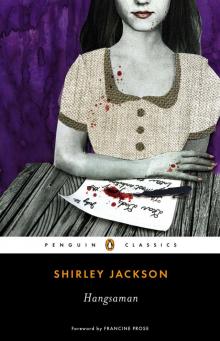 Hangsaman
Hangsaman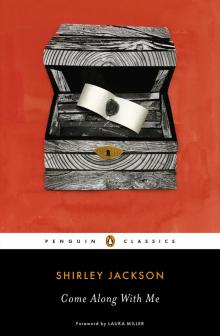 Come Along With Me
Come Along With Me The Lottery
The Lottery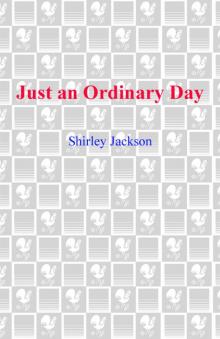 Just an Ordinary Day: Stories
Just an Ordinary Day: Stories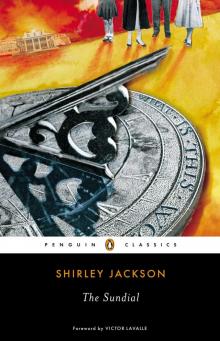 The Sundial
The Sundial Dark Tales
Dark Tales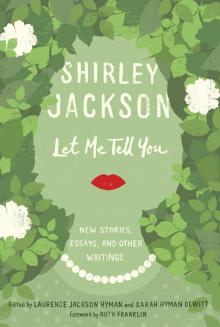 Let Me Tell You: New Stories, Essays, and Other Writings
Let Me Tell You: New Stories, Essays, and Other Writings The Haunting of Hill House
The Haunting of Hill House The Bird's Nest
The Bird's Nest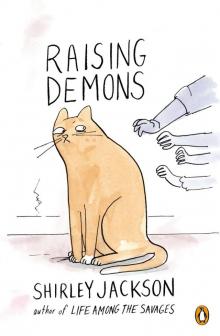 Raising Demons
Raising Demons We Have Always Lived in the Castle
We Have Always Lived in the Castle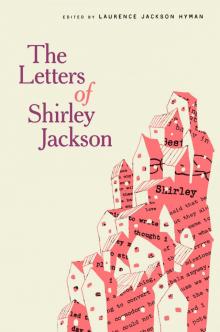 The Letters of Shirley Jackson
The Letters of Shirley Jackson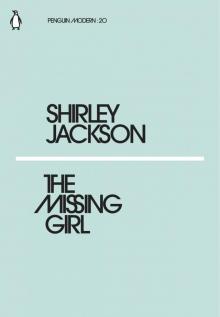 The Missing Girl
The Missing Girl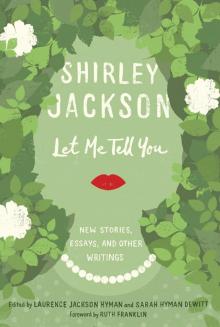 Let Me Tell You
Let Me Tell You